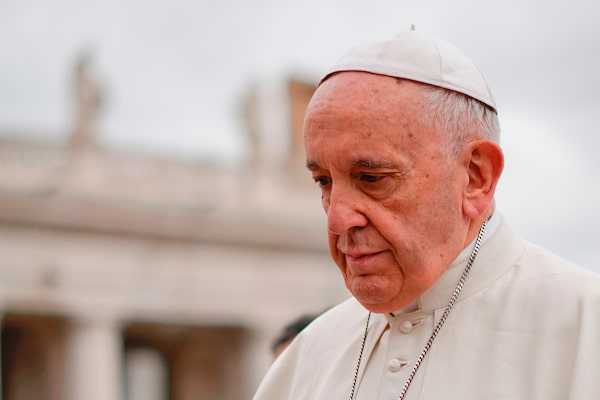
Pope Francis arrives in St.Peter's Square at the Vatican on Wednesday for his weekly general audience.Andrew Medichini/The Associated Press
Canada’s Parliament will ask the Pope to reconsider his refusal to apologize to the Indigenous people who attended Catholic-run residential schools, and for the Catholic Church to make good on its financial obligations under the Indian Residential Schools Settlement Agreement.
A motion calling on the Canadian Conference of Catholic Bishops to invite Pope Francis to make the apology has been drafted by New Democrat MP Charlie Angus and revised slightly by the office of Carolyn Bennett, the Minister of Crown-Indigenous Relations. It is expected to be debated in the House of Commons next week and to pass with the support of the majority Liberal government.
The New Democrats and the Liberals are now in discussions with the other parties in the Commons to determine whether they are willing to give the motion unanimous consent – a vote that would reinforce Canada’s interest in hearing the Pontiff acknowledge and regret the harm done by representatives of his church to generations of Indigenous children in this country.
Given the apology to the former students of Indian residential schools that was delivered by Conservative prime minister Stephen Harper in 2008, and also the work of the Truth and Reconciliation Commission (TRC), Mr. Angus said, “to have this passed without partisan division would send a very strong signal about Canada’s desire to have this issue dealt with so we can move on.”
Dr. Bennett said the government welcomes the opportunity for the House of Commons “to add its voice to demonstrate that this important step in reconciliation is not a partisan issue.”
The motion asks Francis to apologize for the Roman Catholic Church’s role in the spiritual, cultural, emotional, physical and sexual abuse of First Nations, Inuit and Métis children in Catholic-run residential schools, as recommended in the calls to action of the TRC.
It calls on the church to resume its efforts to raise $25-million for Indigenous healing, as required in the residential schools settlement agreement that came into effect in 2007. That fundraising campaign was abandoned in 2015 and just $2.1-million in donations was given to Indigenous causes.
And the motion calls on the church to hand over any remaining documents that could help survivors of the schools, their families and scholars “understand the full scope of the horrors of the residential school system in the interest of truth and reconciliation.”
A similar motion is expected to be introduced in the Senate.
The other Christian denominations that ran residential schools have made their apologies and have made their best efforts to raise funds, Mr. Angus said. “It’s the Catholic Church that has not lived up to its share of the bargain.”
In a letter dated March 27 to the “Indigenous Peoples of Canada,” Lionel Gendron, the Bishop of Saint-Jean-Longueil and the president of the Canadian Conference of Catholic Bishops (CCCB), said “after carefully considering the request and extensive dialogue with the Bishops of Canada, [the Pope] felt that he could not personally respond.”
In an e-mail on Thursday, the CCCB said the Pope has encouraged Canadian bishops “who are aware of local needs and aspirations, who are best positioned as faith leaders and pastors of their dioceses, to foster reconciliation.”
As for reopening the fundraising campaign, the CCCB said there is no legal entity called the Catholic Church in Canada, just individual autonomous dioceses. The 50 smaller dioceses that ran the schools formed a corporation to take part in the settlement agreement, the bishops said, but that corporation has now disbanded.
The CCCB also said it has no records of the residential schools, nor does it have authority over the entities that hold the records.
Francis has not shied away from apologizing for other wrongs done by the church. In 2010, a papal apology was issued to Irish victims of sexual abuse. In 2015, he apologized in Bolivia to the Indigenous peoples of the Americas for the “grave sins” of colonialism. And, just this week, the Pope admitted he made “grave errors” in judgment in Chile’s sex-abuse scandal and invited victims to Rome to beg their forgiveness.
Mr. Angus said he believes that Canada’s bishops did not convince the Pope that an apology was important. “My concern,” he said, “is that it’s the Catholic Bishops who haven’t undertaken this formal process to say we need to deal with this, we need to move on as a church and as a nation.”
Prime Minister Justin Trudeau said on March 28 that he was “disappointed” with the Pope’s refusal to apologize. Conservative Leader Andrew Scheer said later that day that any group or institution that played a significant role in the residential school system should apologize.
Mr. Scheer’s office is reviewing Mr. Angus’s motion and will discuss it at a caucus meeting next week before deciding whether to support it. Seven MPs who recently split with the Bloc Québécois will stand in favour, as will Green Party Leader Elizabeth May.
With a report by Daniel Leblanc